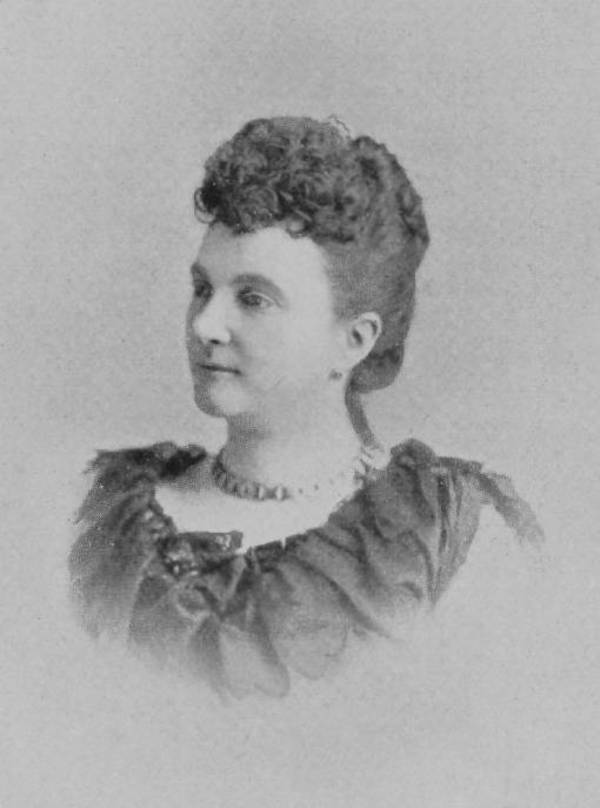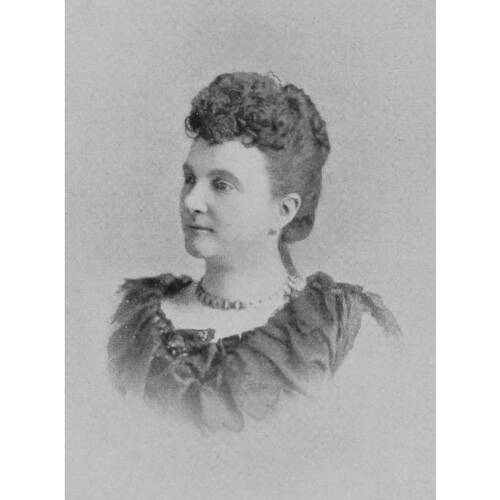
Source: Link
HERRING, FRANCES ELIZABETH (Herring), teacher, mother, journalist, and author; b. 23 Dec. 1851 in King’s Lynn, England, daughter of Jonathan J. Herring and Harriet Clarke; m. 27 Dec. 1874 Arthur May Herring in New Westminster, B.C., and they had eight children, of whom three sons and a daughter lived to adulthood; d. there 16 Nov. 1916.
Born in England to a merchant father and a mother from a locally prominent family, Frances Herring was educated in Reading, where she also taught briefly. Like many others of the English provincial middle class, however, she found that her future lay in the colonies. Reportedly in response to family conflict, in 1874 she left England for the distant shores of British Columbia.
Soon after her arrival, Herring married her cousin Arthur, who had come to British Columbia as a young child. They established a home at Langley, where a town had grown around the old Hudson’s Bay Company fort. Herring resumed her career, becoming certified as a teacher by British Columbia’s Board of Education in July 1875. In March 1876 she was appointed teacher at the Langley school and there, according to the 1877 report of the provincial superintendent of education, she was “one of our best teachers.” She taught academic subjects as well as music, religion, and needlework to her largely aboriginal and mixed-blood students.
In 1878 Herring left Langley and her teaching job and relocated in New Westminster, where her husband had established a wholesale and retail drug business the previous year. She seems to have devoted the 1880s to the family enterprise and child-rearing. Between May 1877 and December 1884 she bore five children, and another three followed. Although the Herrings enjoyed many middle-class luxuries, such as a servant and a summer residence at Boundary Bay, domestic life must have none the less been a formidable obligation for Frances.
Despite family responsibilities, Herring became increasingly involved in journalism during the last decades of the century. She was the editor of the “Home circle” of New Westminster’s British Columbia Commonwealth in 1892. Her column focused on recipes, household hints, and garden advice, but contained inspirational tales of career women and assertive wives and mothers as well. During John Stephen Willison*’s editorship of the Toronto Globe, she reputedly worked as the British Columbia correspondent for that paper.
Herring’s lifelong involvement in community politics and philanthropy intensified after the turn of the century. In the 1870s she had given controversial and explicitly political papers before the British Columbia teachers’ convention. Forty years later, she served as president of the Royal Columbian Hospital Women’s Auxiliary and was a member of the National Council of Women of Canada. A longstanding member of the Church of England, in 1909 and 1910 she was the secretary-treasurer of the literature committee of the New Westminster branch of the Woman’s Auxiliary to the Missionary Society of the Church of England in Canada, which distributed religious materials throughout the province. Also she led Bible study for young women. Her involvement in the community combined with her public advocacy of women’s suffrage to earn her a reputation as a firm supporter of equal rights for women.
Herring’s chief interest, however, was likely her writing of fiction. She employed a romantic, popular style and dealt with a narrow range of subjects, most of which reflected her experience as an immigrant in British Columbia, her feminist sensibilities, and the pervasive influence of turn-of-the-century racist discourse. She began including her own short stories in her British Columbia Commonwealth columns, and later published them in major national magazines. Between 1900 and 1914 she brought out six novels, five of which are set in British Columbia. Their most consistent theme is the experience of white women in moments of cultural contact; they portray immigration, settlement, and relationships with aboriginal and Asian people. Among the people of British Columbia: red, white, yellow, and brown (London, 1903) tells the story of Agnes, a young Englishwoman, her travels around the province, and her observations of its “exotic” non-white peoples. Nan and other pioneer women of the west (London, 1913) offers a series of short stories about white women coping with the challenges of migration and economic survival, tales which Herring thought would allow “younger sisters” to “see for themselves the snares which entrap men when they lack the restraining force of the ‘Motherhood of Women.’” Although Herring is rarely included in discussions of Canada’s literary history, her work was reasonably popular in its day: Among the people of British Columbia and In the pathless west with soldiers, pioneers, miners, and savages (London, 1904) went into second editions. She continued to write and publish until shortly before her death from diabetes in 1916.
Herring’s life suggests that traditional conceptions of “woman’s sphere” did not necessarily define the roles of middle-class white women in western Canada during her day. Although domestic, moral, and religious themes were prominent in her writing, marriage and motherhood did not prevent her from performing paid work, maintaining a successful literary career, or being active in feminist and reform activities. Her status as an English, middle-class woman determined her experience as an immigrant, afforded her the resources to write, and profoundly influenced her interactions with the culturally plural community of British Columbia. Both exceptional and typical, Frances Herring tells us much about the limits and the possibilities of white women’s lives in the British Columbia of her time.
[Details concerning Frances Elizabeth Herring were graciously supplied to the author by Philip and Marion Grace Herring of Burnaby, B.C., in an interview on 21 Dec. 1994. a.p.]
Frances Herring’s other three novels, all published in London, are Canadian camp life (1900), Ena (1913), and The gold miners; a sequel to “The pathless west” (1914). An example of her short fiction is “A pioneer marriage in Alabama,” Canadian Magazine, 5 (May–October 1895): 375–77. A number of reference sources, including A bibliography of British Columbia: laying the foundations, 1849–1899, comp. B. J. Lowther (Victoria, 1968), and R. E. Watters, A checklist of Canadian literature and background materials, 1628–1960 (2nd ed., Toronto and Buffalo, N.Y., 1972), incorrectly give her family name as Clarke, her mother’s name.
ACC, Diocese of New Westminster Arch. (Vancouver), New Westminster Diocesan Board of Anglican Church Women fonds, box D549, file 3, Woman’s Auxiliary, board minutes, 1909–10. BCARS, Vert. file, F. E. Herring. City of Vancouver Arch., St Mary’s Church (Sapperton), reg. of marriages, 1874 (mfm.). NA, RG 31, C1, 1881, 1891, New Westminster, B.C. New Westminster Public Library, S. Bowell and Sons Funeral Home, book 2 (May–December 1917); book 24 (May 1941). British Columbia Commonwealth (New Westminster), 1892. British Columbian (New Westminster), 18 Nov. 1916. Mainland Guardian (New Westminster), 1872–88. B.C., Legislative Assembly, Sessional papers, 1876–78, reports on the public schools, 1874/75–1876/77. Canadian men and women of the time (Morgan; 1912). National Council of Women of Canada, Year book (Toronto), 1912. Scholefield and Howay, British Columbia. Woman’s who’s who of America; a biographical dictionary of contemporary women of the United States and Canada, ed. J. W. Leonard (New York, 1914; repr. Detroit, 1976).
Cite This Article
Adele Perry, “HERRING, FRANCES ELIZABETH (Herring),” in Dictionary of Canadian Biography, vol. 14, University of Toronto/Université Laval, 2003–, accessed April 29, 2025, https://www.biographi.ca/en/bio/herring_frances_elizabeth_14E.html.
The citation above shows the format for footnotes and endnotes according to the Chicago manual of style (16th edition). Information to be used in other citation formats:
| Permalink: | https://www.biographi.ca/en/bio/herring_frances_elizabeth_14E.html |
| Author of Article: | Adele Perry |
| Title of Article: | HERRING, FRANCES ELIZABETH (Herring) |
| Publication Name: | Dictionary of Canadian Biography, vol. 14 |
| Publisher: | University of Toronto/Université Laval |
| Year of revision: | 1998 |
| Access Date: | April 29, 2025 |



